Permanent Saturday: Something about the presence of a cat
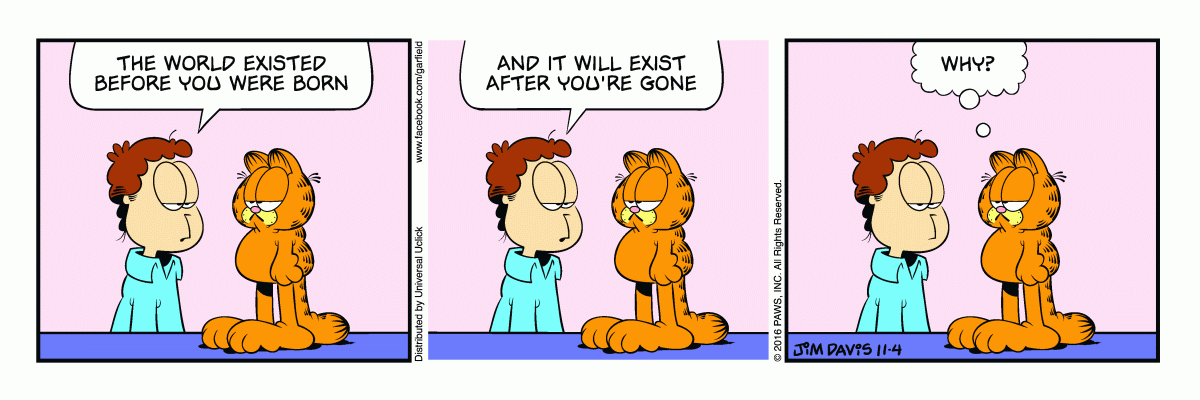
With deepest apologies to Chris Stangl, Permanent Saturday is a semiregular critical exploration of Jim Davis’ comic strips Garfield and U.S. Acres/Orson’s Farm.
The first level this strip works on is a standard joke about Garfield’s ego. We see variations on this joke, just as we see variations on all Garfield‘s jokes, show up infrequently every so often: Jon will make a quip about how the world does not revolve around Garfield (though he is big enough for it to), or that Garfield is not the centre of the universe, which Garfield will either deny or quip back that if he isn’t he should be. Sometimes the roles are reversed, with Garfield opening the strip declaring he’s the centre of the universe, which Jon will then proceed to reject.
The impetus for the joke’s setup comes from actual cat behaviour: Much of Garfield’s personality is derived from taking humans’ observations and interpretations of the things their housecats did and anthropomorphizing them: Cats are vain, cats are aloof, cats only care about me for what they can get from me, they claw things I don’t want them to claw, don’t listen to my commands like my dog does, and so on and so forth. So Garfield asks us to imagine how cats would display this behaviour if they could rationalize like humans do, and then, without missing a beat, turns around and points out the absurdity of its own question. Because for one thing, the joke is, of course, double-edged: Jon may mock Garfield and accuse him of having an inflated ego, but the cat is right. After all, whose name has the title of the comic been given, and who is its central character? The defense rests.
(Indeed, this may literally be the oldest joke in the book: Jim Davis has said that he *was* originally going to call the strip Jon, and just give his star a sarcastic and witty cat as a supporting foil, but his syndicate said the strip simply *had* to be about the cat, because that would make it an instant smash hit. This contradicts some other accepted wisdom about Garfield‘s origin, but it’s funny, and that’s all that matters. Deep time again.)
There are other ways Garfield gets amusingly bleak self-deprecating mileage out of this setup, but that’s for us to explore Another Time. The variation this time has Jon trying to disarm Garfield with an existential quandary, attempting to force him to contemplate his own mortality and impermanence. This is first of all weaksauce, because Garfield is fully aware of that already considering every year he views his birthday with an ominous sense of doom and nihilistic despair, seeing it as one more step towards erasure and nothingness. But Garfield more or less has negative continuity anyway, at least when it comes to characterization and character development, so this is a largely irrelevant counterargument. Instead, let us consider the cosmological appearance of Jon’s thesis.
First of all, returning to our initial reading, the world would not continue to exist without Garfield because Garfield is the world: It’s his mark.…

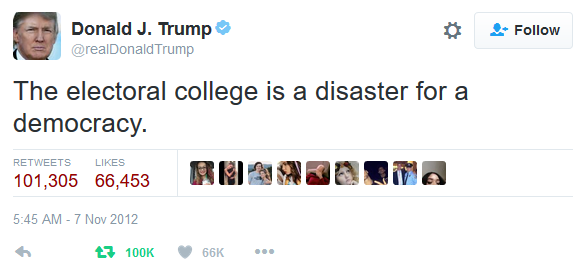 The Democrats’ vote collapsed. Many people who had previously voted Democrat, and many people who might’ve been expected to, didn’t go to the polls for Hillary Clinton. There is, undoubtedly, a degree to which sexism is involved here. I don’t want to minimise that. Hillary is the subject of a great deal of venomous misogynistic hatred. She comes in for loathing more than male politicians with equally grubby histories. She is often the redirected hate-object for people who have come to hate her husband and his legacy. The Clintons generally have become obsessive hate-objects for many Americans – particularly but by no means exclusively conservative Americans, despite being both extremely right-wing in real terms. The reasons are interesting but somewhat outside our scope here.
The Democrats’ vote collapsed. Many people who had previously voted Democrat, and many people who might’ve been expected to, didn’t go to the polls for Hillary Clinton. There is, undoubtedly, a degree to which sexism is involved here. I don’t want to minimise that. Hillary is the subject of a great deal of venomous misogynistic hatred. She comes in for loathing more than male politicians with equally grubby histories. She is often the redirected hate-object for people who have come to hate her husband and his legacy. The Clintons generally have become obsessive hate-objects for many Americans – particularly but by no means exclusively conservative Americans, despite being both extremely right-wing in real terms. The reasons are interesting but somewhat outside our scope here.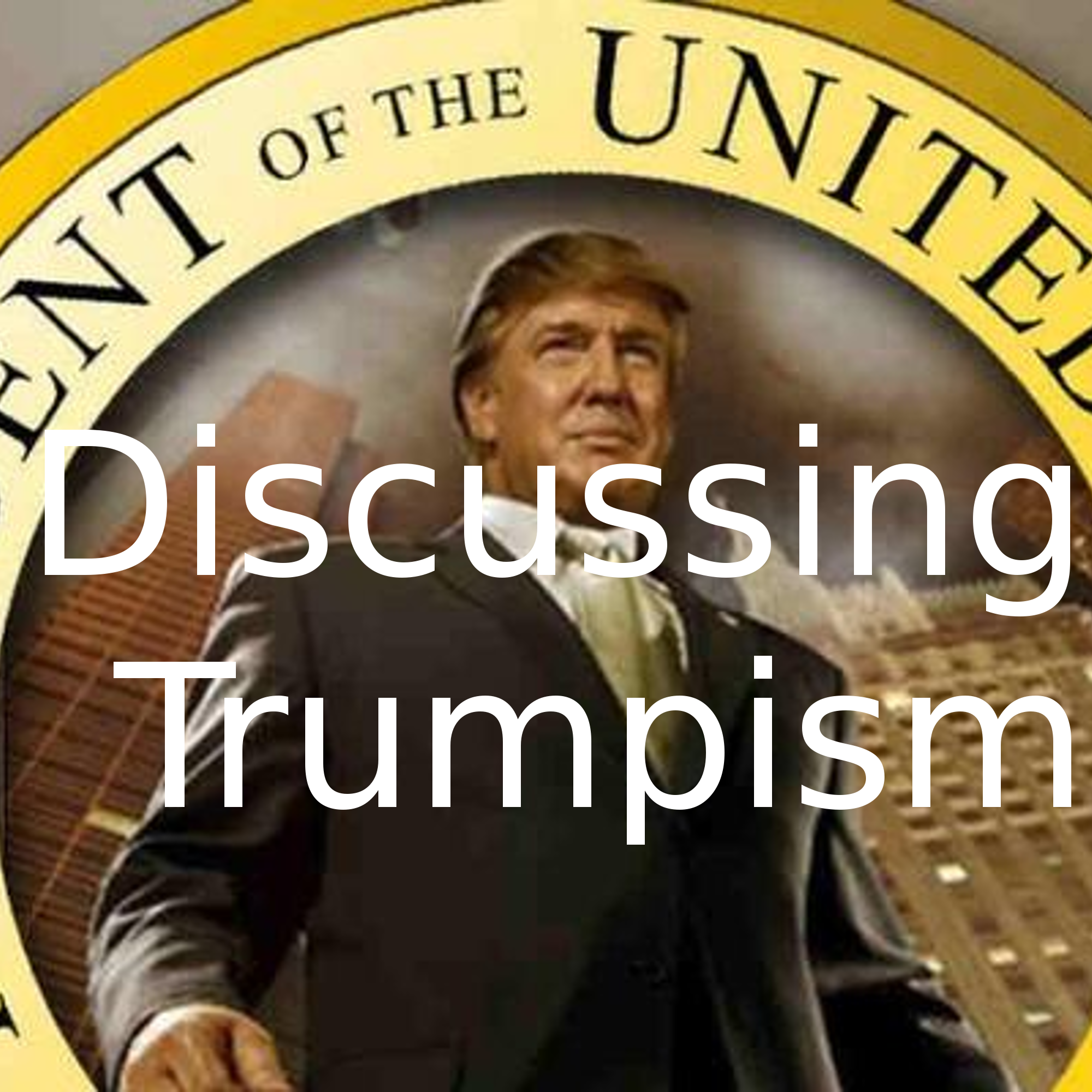 I’m sorry I haven’t been producing more content lately, either in written or podcast form. I’ve got a new Consider the Ray Gun about 95% done, discussing Dune with James Murphy, and the next Searching For Fuchal has been recorded, although I haven’t even begun to edit yet. I’ve also got an upcoming Oi! Spaceman on The Space Museum, and it looks like 2017 is going to be the year I take a systematic look at Quentin Tarantino and other 90s-vintage indie filmmakers.
I’m sorry I haven’t been producing more content lately, either in written or podcast form. I’ve got a new Consider the Ray Gun about 95% done, discussing Dune with James Murphy, and the next Searching For Fuchal has been recorded, although I haven’t even begun to edit yet. I’ve also got an upcoming Oi! Spaceman on The Space Museum, and it looks like 2017 is going to be the year I take a systematic look at Quentin Tarantino and other 90s-vintage indie filmmakers. 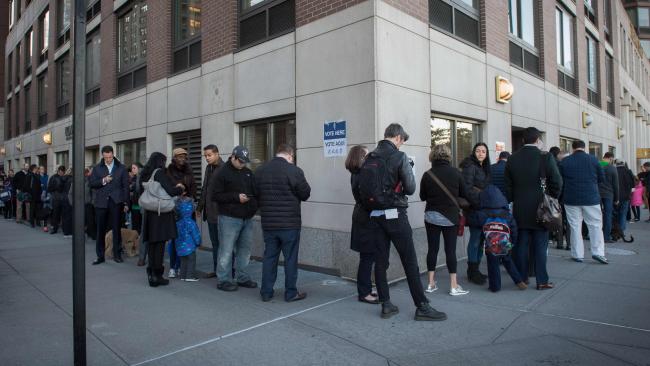 My response to the victory of blithering pea-brained plutocrat Donald J. Trump in the recent US Presidential election just kept getting longer and longer. So I’ll have to split it up into sections and post them separately. Here’s the first bit:
My response to the victory of blithering pea-brained plutocrat Donald J. Trump in the recent US Presidential election just kept getting longer and longer. So I’ll have to split it up into sections and post them separately. Here’s the first bit: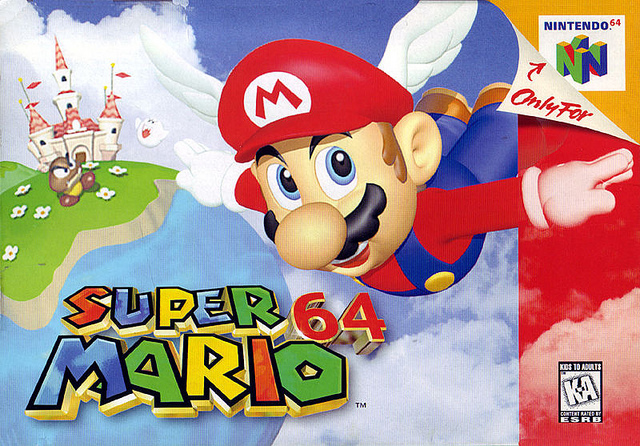 No comics reviews this week. I just can’t. We’ll see about next week when we get there, but I was thinking of winding down the feature anyway, so peg your expectations accordingly. Instead, here’s this week’s Super Nintendo Project.
No comics reviews this week. I just can’t. We’ll see about next week when we get there, but I was thinking of winding down the feature anyway, so peg your expectations accordingly. Instead, here’s this week’s Super Nintendo Project..png) Blasphemy, they would have said.
Blasphemy, they would have said.